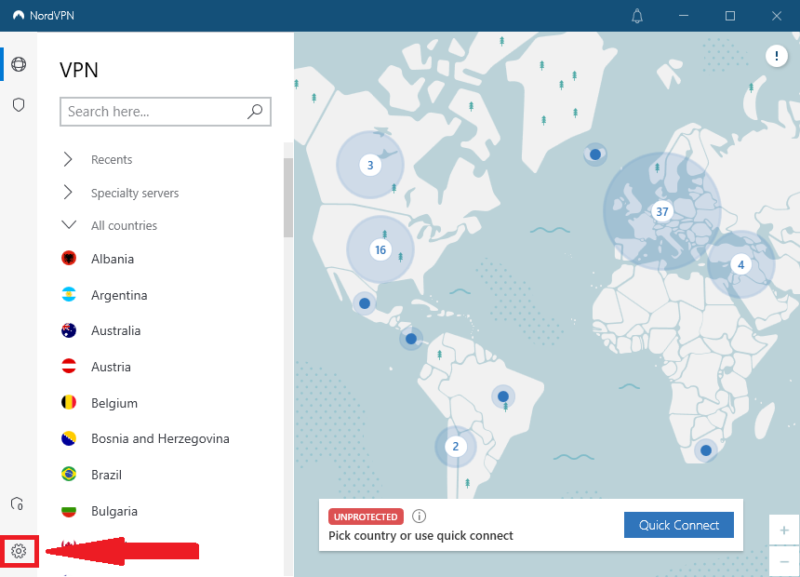What Is Onion Over VPN & How Does It Work in 2025?
The Tor network is one of the best ways to browse anonymously, but it comes with many dangers. A VPN provider with an “Onion over VPN” feature lets you access the Tor network without using the Tor Browser, and can protect your identity while you’re using it.
The Tor network catches a lot of flak for being the gateway to the dark web, but it’s actually an excellent way to ensure privacy and anonymity on the internet. However, or network (also called the Onion network) is run by anonymous volunteers, which can pose a security risk. Using a VPN provider with an “Onion over VPN” feature is the best way to mitigate that risk.
Onion over VPN combines VPN technology with Onion routing to create a nearly impenetrable barrier to your identity, though you still have to use it responsibly. Keep reading to find out what exactly Onion over VPN is, how it works and why you might want to use it.
-
10/01/2024
We updated this tutorial and reassessed the VPN positions based on our latest testing.
What Is Onion Over VPN?
Onion over VPN is simply accessing the Tor network through a VPN. This may seem odd, as VPNs and the Onion network serve a similar purpose: They encrypt your traffic and reroute it to hide any identifying data about you. To explain what Onion over VPN is, though, we first need to explain what the Tor network is.
How Does the Tor Network (Onion Network) Work?
The Tor network works by running your traffic through multiple nodes, encrypting your data through each node to obscure the original source and its path through the network. Each of these nodes is a computer run by a volunteer to help build the network.
Protect Your Privacy. Get Our Free VPN Guide Now!
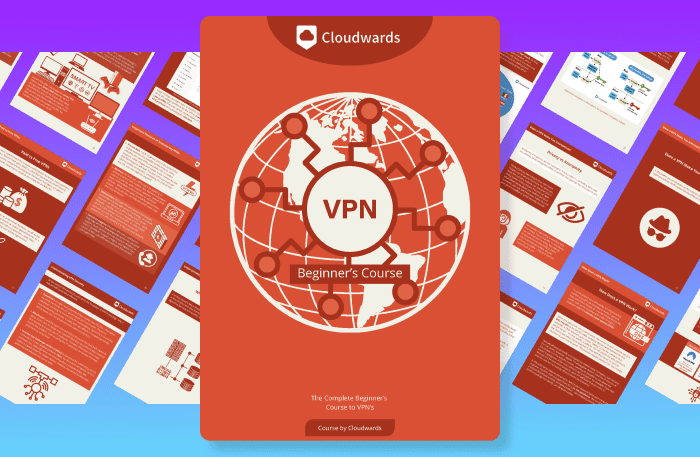
- Comprehend the essential role a VPN plays in safeguarding your digital life
- Gain a deep understanding of how VPNs function under the hood
- Develop the ability to distinguish fact from fiction in VPN promotions
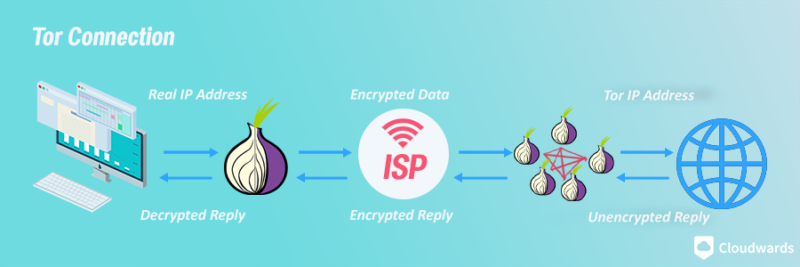
If you know how a VPN works, you’ll notice two similarities. First, they both run your traffic through another location, with Tor using Tor nodes, and VPNs using VPN servers. Second, they both encrypt your traffic data, making it impossible to read.
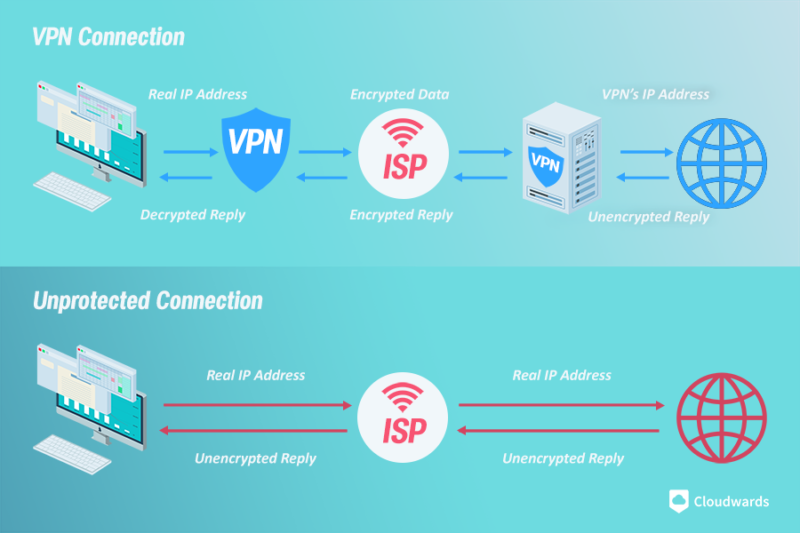
Onion over VPN, or Tor over VPN, is a VPN feature that merges the two concepts. Our VPN vs Tor guide explains how they compare in more detail.
How Does Onion Over VPN Work?
Onion over VPN works by encrypting your traffic through a VPN server before it enters the Tor network. In the Tor network, your data gets bounced around several nodes, adding a layer of encryption each time it passes a node. The signal must pass through at least three nodes: the entry node (or guard node), the middle node and the exit node.
As it passes the middle node and nears an exit node, the layers of encryption get peeled back at each node (hence the name “onion routing”).
When it reaches a Tor exit node, your traffic gets fully decrypted and sent to whatever website you were trying to visit. This makes it appear as though you’re accessing the internet from that node, instead of your own device.
Do I Need a Tor Browser to Access the Tor Network?
You don’t need a Tor browser to access the Tor network, any VPN provider with an Onion over VPN feature will let you access it. However, regular browsers won’t let you open deep web websites or onion sites (websites ending in .onion). In that case, you will need to use the Tor Browser.
There aren’t many VPN providers that offer this VPN feature, though. Among our best VPN choices, only NordVPN and ProtonVPN offer it (read more about those VPNs below).
How to Use Onion Over VPN
Accessing the Onion network with the Onion over VPN feature is easy, as long as you know what to look for. The two VPN services implement their Tor integration differently, so we’ll go through the process on both ProtonVPN and NordVPN.
Using NordVPN Onion Over VPN
NordVPN’s Onion over VPN feature is handled as a set of specialty servers. However, accessing those servers isn’t always straightforward, as you might not be able to see them if you’re not using the OpenVPN protocol. The guide below will show you how to switch your protocol to OpenVPN and connect to a NordVPN Onion over VPN server.
- Reveal the VPN Protocol Settings
Next, open the “auto-connect” tab. If the option to automatically choose a VPN protocol is on, toggle it off. This will show the protocol settings.
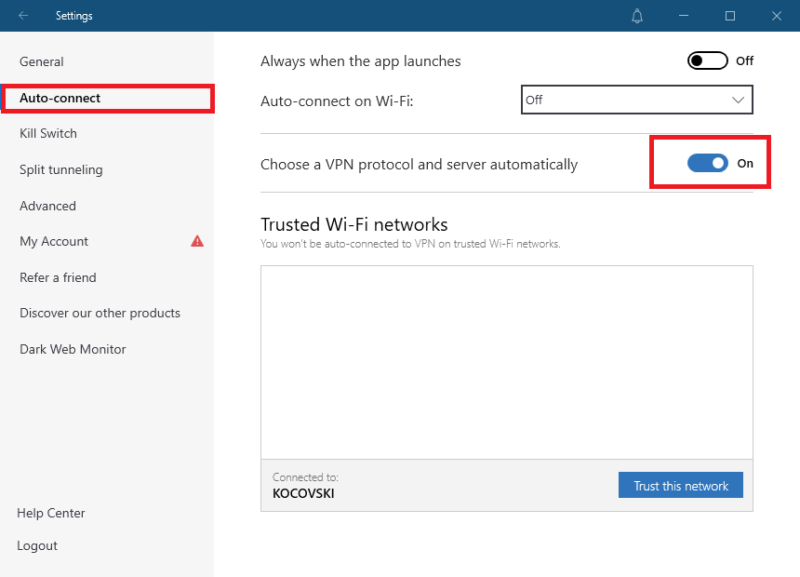
- Switch the VPN Protocol to OpenVPN
Under “VPN protocol,” choose “OpenVPN (TCP).” We don’t recommend using UDP as it can cause faulty data transmissions.
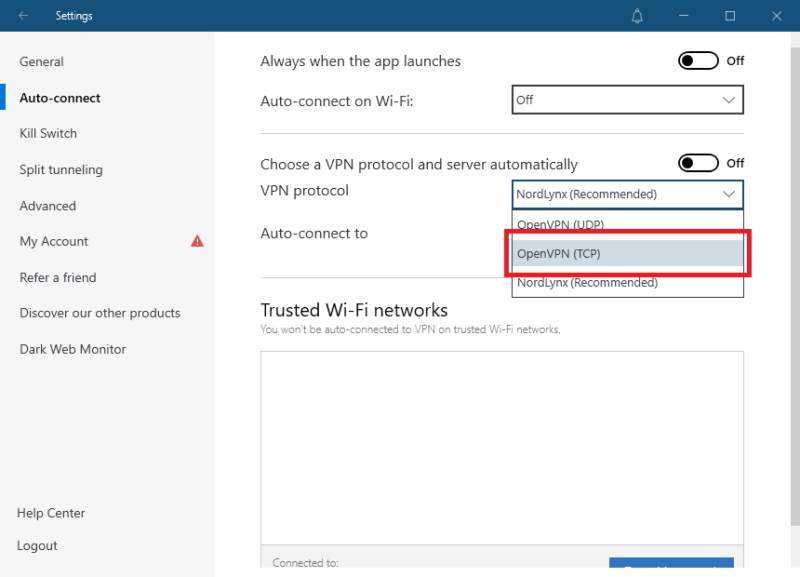
- Access the Onion Over VPN Servers
With the VPN protocol switched to OpenVPN, head back to the home screen. You should now be able to see the Onion over VPN servers listed under “specialty servers” in the server list (left of the world map). Click on “specialty servers” to expand the list and see the Onion servers.
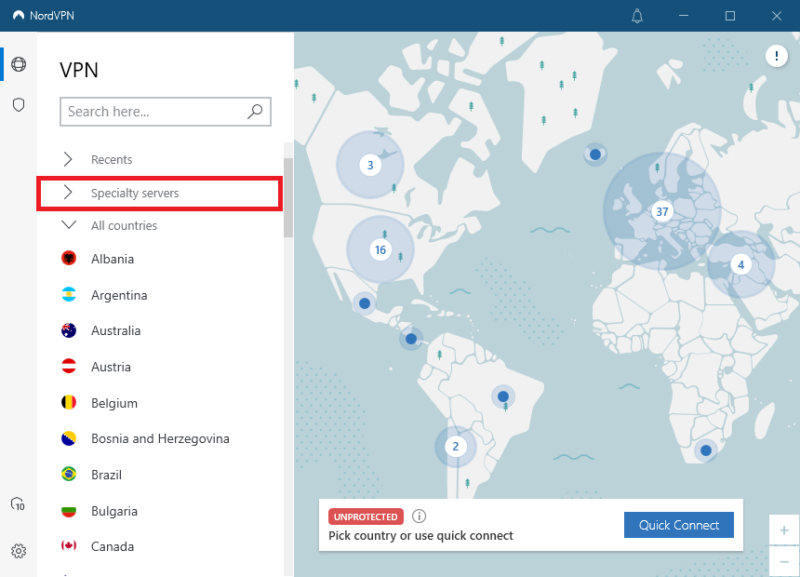
- Connect to an Onion Over VPN Server
Now click on “Onion over VPN.” This will connect you to the fastest available servers automatically. To select a specific server, click on the three dots menu that appears when you hover over “Onion over VPN.” This will show you a list of server locations to choose from. Click on any of them to connect you to the Onion network via your VPN.
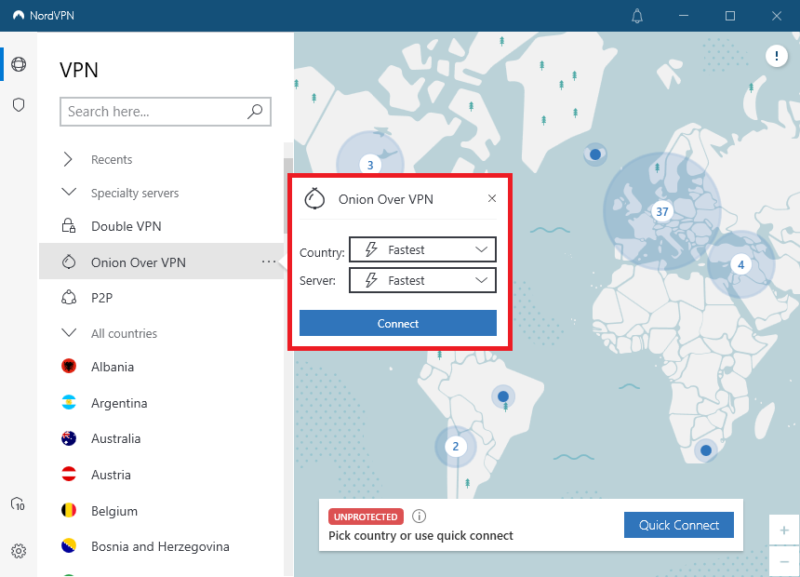
Using Tor Over VPN in ProtonVPN
ProtonVPN’s implementation of Onion over VPN is called Tor over VPN and is a bit simpler to use than NordVPN’s version.
- Access the Search Bar
Click on the search bar above the server list, left of the world map interface.
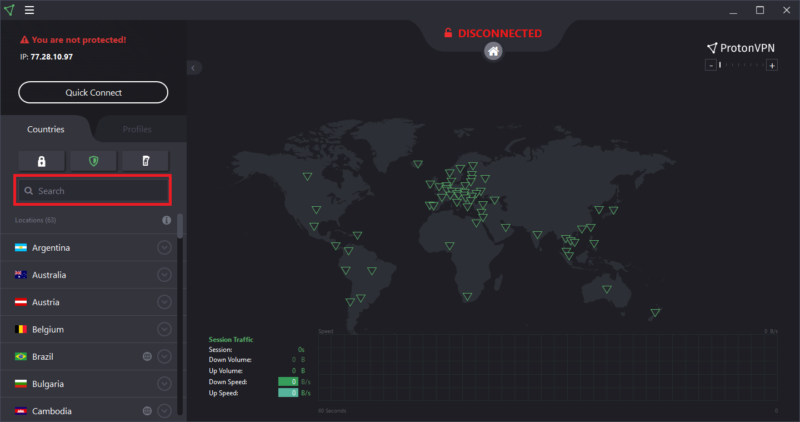
- Find a Tor Over VPN Server
All of ProtonVPN’s Tor VPN servers have the word “TOR” in their name (for example, FR#13-TOR). Type “tor” into the search bar. You’ll probably need to scroll past the Toronto servers (“Toronto” has “tor” in it) to find a Tor server with a name like in the previous example. Picking one close to you will make sure your speeds aren’t impacted too badly.
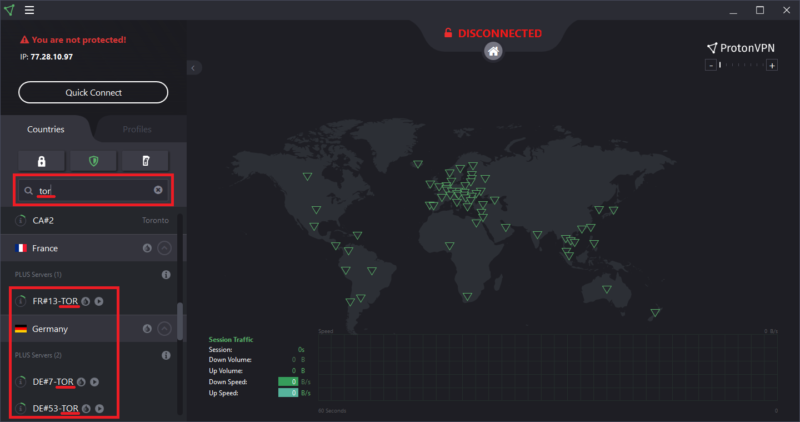
- Connect to a Tor VPN Server
Hover over any of the Tor servers to reveal the “connect” button. Then, simply click “connect” to route your internet traffic through the Onion network.
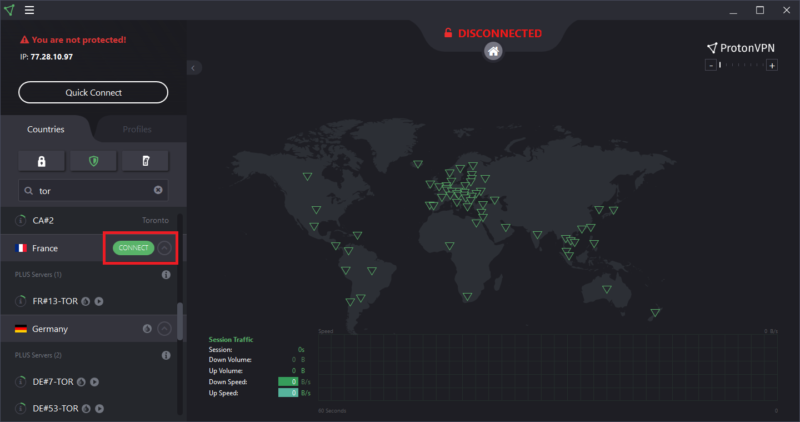
VPNs With Onion Over VPN or Tor Over VPN
As we mentioned, NordVPN and ProtonVPN are the only two VPN providers that have built-in Onion network access. Let’s take a look at what each of these offers.
1. NordVPN — Best VPN for Tor
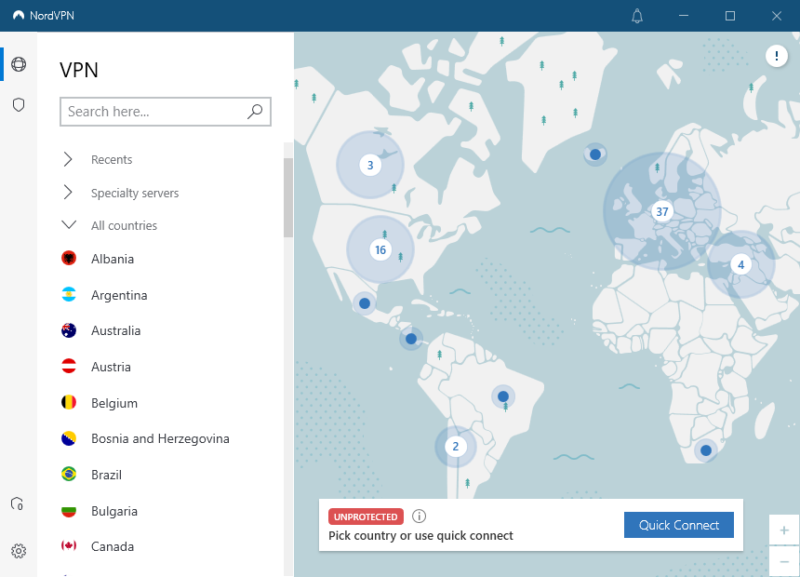
NordVPN is the best VPN for Tor and always ranks at the top of our VPN comparison lists. It’s fast and reliable, and it offers a ton of security features, including Onion over VPN servers.
It uses a custom protocol called NordLynx that’s based on the speedy WireGuard, but with an added layer of security. Unfortunately, Onion over VPN only works with the slower OpenVPN. If you need a faster alternative to Onion over VPN, NordVPN also offers double VPN servers, which route your traffic through two VPN server locations, providing more protection.
NordVPN isn’t exactly a budget VPN, though it’s better-priced compared to other options like ExpressVPN. Read our NordVPN review for more, or make use of its 30-day money-back guarantee.
- **VAT may apply
- Unlimited GB
- 10
- Yes
- *The prices are charged in the first billing cycle only. Renewal prices vary.
- Unlimited GB
- 10
- Yes
- *The prices are shown only apply for the first 12 months.
- Unlimited GB
- 10
- Yes
- **The prices are applicable only for the first 24 months. Secure, high-speed VPN Threat Protection Pro™: Anti-malware and advanced browsing protection Threat Protection Pro™: Ad and tracker blocker Password manager with Data Breach Scanner 1 TB of encrypted cloud storage Identity and SSN monitoring and alerts Credit monitoring services Up to $1M in identity theft insurance Up to $100K in cyber extortion insurance
- 10
2. Proton VPN — Secure VPN for Tor
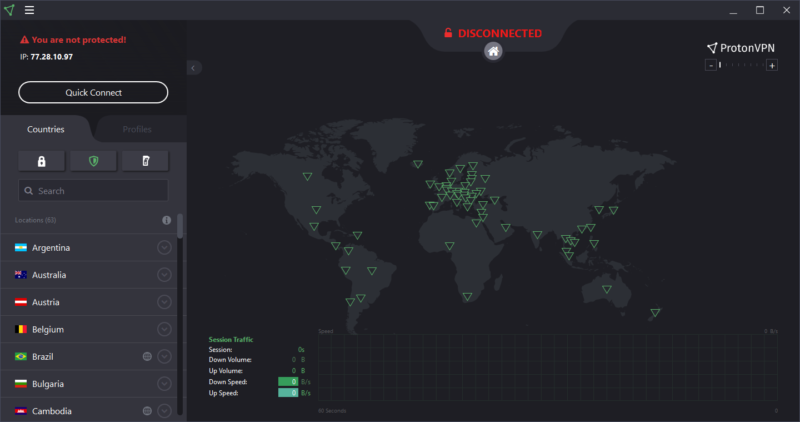
ProtonVPN is most famous for its free plan that doesn’t limit your data or bandwidth. However, it puts free users on busier servers, which results in a soft speed cap, and it limits them to just one connected device. Free users are also limited to only three server country locations: the U.S., Japan and the Netherlands — and don’t include the Tor over VPN server options.
That said, ProtonVPN is an excellent VPN that’s especially focused on user privacy, which is why it’s one of the rare VPNs that offers a Tor over VPN feature. Additionally, in our VPN speed tests, ProtonVPN managed the highest download speeds, which makes it excellent for streaming, though keep in mind that this is on the paid plan, not the free one.
Speaking of pricing, ProtonVPN offers different features on different subscription plans, and unfortunately, only the expensive Plus plan has the Tor over VPN feature. Read more in our ProtonVPN review or get the free plan to test it out.
- Unlimited GB
- 1
- Yes
- 500 GB storage 1 user 15 extra email addresses for you Support for 3 custom email domains Unlimited folders and labels Unlimited hide-my-email aliases Dedicated customer support Ultra fast and private VPN Encrypted password manager Encrypted cloud storage for photos and documents Advanced account protection
- Unlimited GB
- 10
- Yes
- **Renewal prices differ for the 1-year and the 2-year plans. Price includes all premium Proton services (Proton Mail, Calendar, Drive, VPN, Pass, & Wallet)
- Unlimited GB
- 10
Who Needs Onion Over VPN?
If you’re a journalist or if you’re living in a country with a repressive regime, we would recommend using a VPN-Onion connection. A standard VPN connection might not be traceable, but it can still reveal the fact that you’re using a VPN service, which might be banned by the country you’re in or the website you’re trying to access.
Tor traffic is anonymous because there’s almost no way to tell where it’s coming from. If you’re using Onion over VPN, the website will see the Tor exit node’s IP address instead of the VPN server’s IP address, hiding your VPN web traffic.
Additionally, if you want to use the Onion network for whatever reason, some ISPs might block you from using it. Using a VPN service will prevent the ISP from knowing that you’re using the Tor network, and they won’t be able to block its use.
Is Onion Over VPN Safe?
Yes, Onion over VPN is generally safe. The volunteer-based nature of the Tor network is its main security fault. To run a node, volunteers link their hardware to the Onion network and allow it to route Tor traffic.
However, there aren’t any checks for who runs these nodes, which means that some of them could be run by hackers. Many of them are even run by intelligence agencies in an attempt to thwart crime on the dark web.
This is why using the Onion network without a VPN can be dangerous. Thankfully, Onion over VPN should be much safer than using the Onion network by itself because the VPN encrypts your traffic before it ever reaches a Tor entry node. However, you could still fall prey to malicious exit nodes, as you’ll see below.
The Drawbacks and Dangers of Onion Over VPN
One of the main drawbacks of using Onion over VPN is slow connection speeds. It gets slowed down significantly because your internet traffic gets encrypted so many times and has to travel through multiple servers and nodes. Though if you’re in a sensitive position where your safety is on the line, the speed trade-off will certainly be worth it for the extra security.
Another drawback is that many websites block Tor traffic altogether, so you can’t access them using Onion over VPN. You also have no control over your IP address, so using Tor to bypass geo-restrictions is more of a shot in the dark.
Worst of all, there are malicious Tor exit nodes that can redirect your traffic to a copycat website and potentially expose your sensitive data. This can result in you potentially losing access to your online accounts, including banking accounts. This is why you should never access websites that hold sensitive data about you while using the Onion network, regardless of whether you’re using a VPN or not.
Final Thoughts
Using the Onion network is a good way to increase your privacy when using the internet, but it comes with some possible security concerns. Onion over VPN is one of the best solutions for using the Onion network safely. We hope this guide left you with a better understanding of what Onion over VPN is and how it works.
We want to reiterate that you need to exercise caution when using the Tor network, even with a VPN. Accessing sensitive data while using the Tor network can result in potentially life-altering consequences, so only use it in times of dire need. Consider NordVPN. There’s no need to hesitate — NordVPN’s 30-day refund policy allows you to experience its benefits firsthand without any long-term obligation.
Have you ever used the Onion network? Do you use NordVPN’s Onion over VPN often? Are you willing to pay a premium for ProtonVPN’s plan to access its Onion over VPN feature? Please let us know in the comments below, and as always, thank you for reading.
FAQ
Onion over VPN is a NordVPN feature that routes your internet traffic through the Onion network (also known as the Tor network), in addition to protecting your online activity via regular VPN technology.
Tor is a network of computers that encrypts and hides your web traffic, to make it seem as if it comes from another place. While this is similar to what a VPN service does, the two technologies are vastly different.
We recommend always using a VPN when you’re online, regardless of whether you’re using Tor or not. That said, using Tor is fraught with dangers to your privacy because of the volunteer-based nature of the Onion network, which is why it’s crucial to use a reliable no-logs VPN service with it.
Using a VPN is the best way to protect yourself online, so long as you’re using a trusted VPN provider. Because the Onion network is run by anonymous volunteers, there’s no telling who could be privy to your Tor traffic if you’re not also using a VPN.



